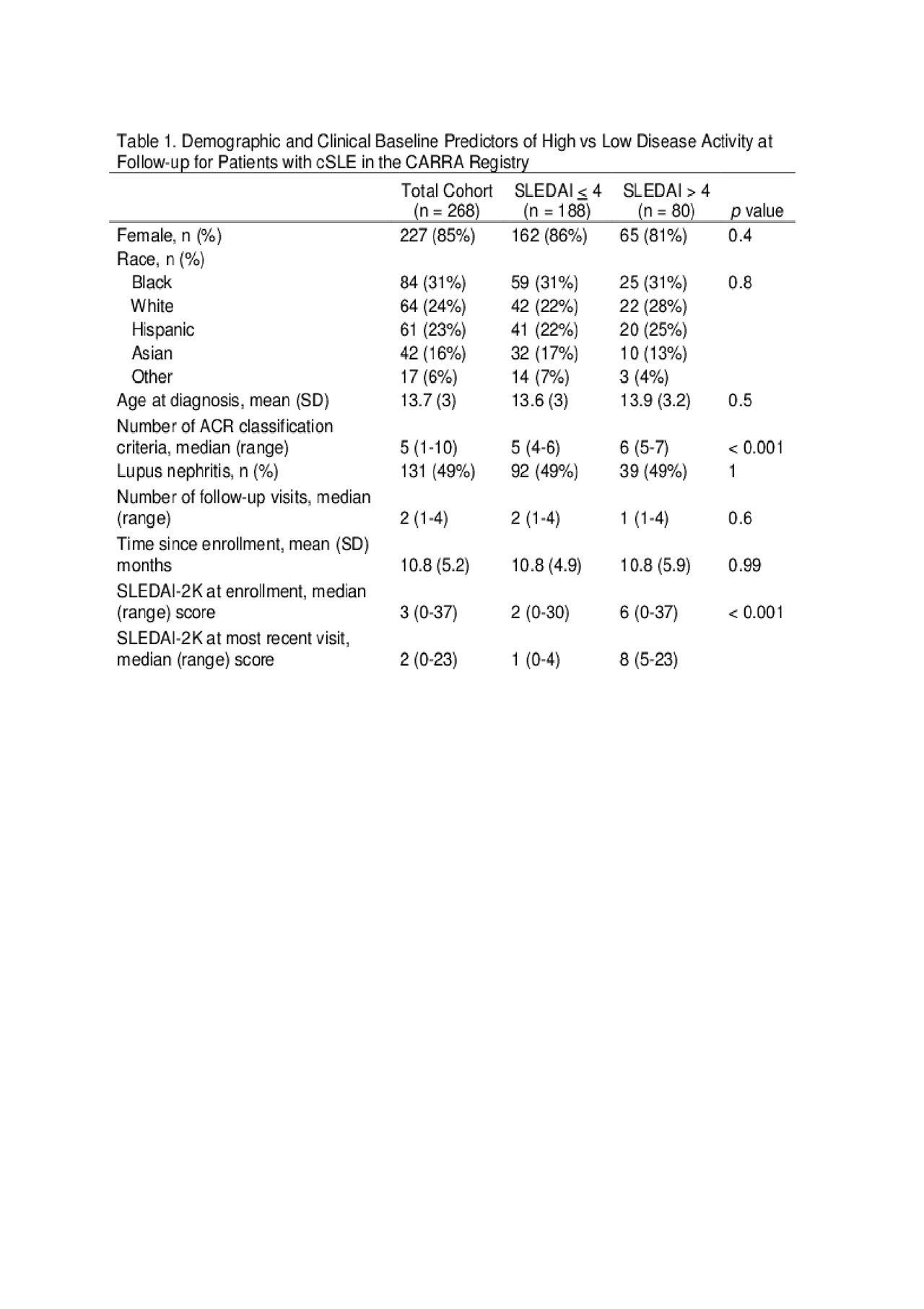Session Information
Date: Monday, November 11, 2019
Title: Pediatric Rheumatology – ePoster II: SLE, Juvenile Dermatomyositis, & Scleroderma
Session Type: Poster Session (Monday)
Session Time: 9:00AM-11:00AM
Background/Purpose: Substantial risk of early morbidity and mortality exists for patients with childhood-onset systemic lupus erythematosus (cSLE) despite widespread use of immunosuppressive therapy. There are limited studies describing predictors of longitudinal disease activity in cSLE. Our objective was to determine patient-level demographic and clinical predictors for high disease activity scores.
Methods: We performed a retrospective analysis of prospectively collected data from the Childhood Arthritis and Rheumatic Disease Research Alliance (CARRA) Registry. Eligible patients had symptom onset before 18 years, new diagnosis of cSLE or established cSLE with new onset lupus nephritis within 24 months of enrollment, and were less than 21 years at enrollment. Data was collected every 6 months, and patients were included if at least one follow-up visit was recorded in the Registry. The primary outcome was Systemic Lupus Erythematosus Disease Activity Index 2000 (SLEDAI-2K) at most recent visit, dichotomized into ≤ 4 (low disease activity) or > 4 (high disease activity). Predictor variables included sex, race, age at diagnosis, number of ACR classification criteria at diagnosis, presence of lupus nephritis, number of follow-up visits, time since enrollment in months, and SLEDAI-2K at enrollment. Descriptive statistics were calculated across the study population. Univariate analyses were performed using two-sample Student t test or Mann-Whitney U test for continuous variables and Chi-square for categorical variables.
Results: We identified 268 cSLE patients enrolled in the CARRA Registry with a mean duration of 10.8 months and median of 2 follow-up visits (Table 1). This multiracial North American cohort was 85% female with a mean age at diagnosis of 13.7 years. Lupus nephritis was present in 49%. The median (range) SLEDAI-2K score at enrollment was 3 (0-37) and at most recent visit was 2 (0-23). At the most recent visit, 30% of patients had high disease activity. Statistically significant differences between the high and low disease activity groups were noted in the number of ACR classification criteria and the SLEDAI-2K at enrollment, with higher number of criteria (p < 0.001) and higher SLEDAI-2K at enrollment (p < 0.001) in the high disease activity group. Interestingly, in the high disease activity group, the median SLEDAI-2K was 2 points higher at the most recent visit compared to enrollment, which may indicate more disease activity flare in this subgroup.
Conclusion: This study provides an initial analysis of predictors of disease activity scores in cSLE patients enrolled in the longitudinal CARRA Registry. While the majority of patients had a low disease activity score at their most recent visit, there was still a substantial proportion of patients with high disease activity. The number of ACR classification criteria and SLEDAI-2K at enrollment were significant predictors of subsequent disease activity scores, highlighting the importance of including these factors in future longitudinal analyses. Additional investigation is needed to better understand modifiers of disease activity, such as early diagnosis and treatment, in order to identify targets for intervention and improved outcomes.
To cite this abstract in AMA style:
Smitherman E, Son M, Knight A, Beukelman T, Curtis J, Hersh A. Disease Activity in Childhood-Onset Systemic Lupus Erythematosus: Initial Analysis of the Childhood Arthritis and Rheumatology Research Alliance Registry [abstract]. Arthritis Rheumatol. 2019; 71 (suppl 10). https://acrabstracts.org/abstract/disease-activity-in-childhood-onset-systemic-lupus-erythematosus-initial-analysis-of-the-childhood-arthritis-and-rheumatology-research-alliance-registry/. Accessed .« Back to 2019 ACR/ARP Annual Meeting
ACR Meeting Abstracts - https://acrabstracts.org/abstract/disease-activity-in-childhood-onset-systemic-lupus-erythematosus-initial-analysis-of-the-childhood-arthritis-and-rheumatology-research-alliance-registry/

